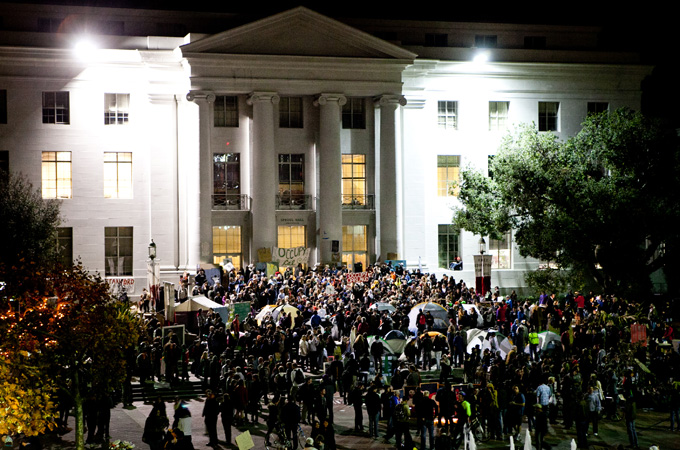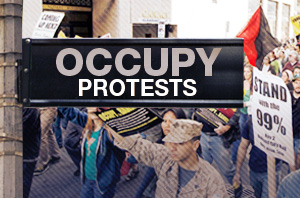
by Rose Aguilar | Opinion - Al Jazeera English http://aje.me/zDt6Az

Last fall, University of California students struck in solidarity with the Occupy Wall Street movement [GALLO/GETTY]
05 Mar 2012 13:34 | San Francisco, CA - I recently invited University of California-Davis sophomore Sarena Grossjan-Navarro to join my radio show - focusing on the Occupy Education actions taking place across the country, and the recent plan to descend on Sacramento to Occupy the Capitol, but she wasn't available. She's taking a heavy load this term, hoping to incur as little debt as possible. She was almost forced to drop out last term because the financial aid she receives is not enough to cover the basics. She's currently sleeping on friends' couches because she can't afford housing.
Grossjan-Navarro was one of the UC-Davis students who got pepper-sprayed by a police officer wearing riot gear during a peaceful protest on November 18, 2011. The students were speaking out against tuition hikes and the brutal treatment of Occupy demonstrators at UC-Berkeley, who were beaten and billy-clubbed a week earlier.
You've might have seen the video, which went viral and received international outrage. Nineteen UC-Davis students and alumni recently sued the University for constitutional violations over the incident, which was not only traumatising, but caused them burning sensations for days.
To say that students and faculty are angry and fed up is putting it lightly. Over the past year, we've seen students across the United States protest, hold walk-outs and teach-ins, and even shut down freeways and bridges. The Occupy movement has energised and yes, even radicalised, a new generation of students who haven't been politically active until now.
They're barely making ends meet. They're going to the school food pantry because they can't afford enough food. They're either racking up debt or are on the verge of dropping out because of ongoing tuition hikes. They deserve better.
Tuition hikes
Tuition and fees at the University of California's 10 campuses are up a whopping 21 per cent this year, according to the College Board. According to this UC-Davis fact sheet, the total cost of attendance for an on-campus undergraduate is $31,199 a year. Commuters living with parents should expect to pay $24,542. Those figures include books, which can cost more than $100 each, supplies, room and board, personal expenses and transportation.
Students attending one of California State University's 23 campuses will see their tuition increase by $498, or another nine per cent, for the 2012-2013 academic year, bringing the annual bill to $7,017. It's the ninth tuition increase in nine years. Tuition at community colleges is going up another $10 to $46 a unit in May. Full-time students typically take 15 units a semester.
Over the past four years, California state lawmakers have cut more than $1.5bn from the state's colleges and universities. Students are struggling to take the classes they need, class sizes are growing, faculty are seeing their salaries and benefits cuts, and services are being slashed.
As states across the country tighten their budgets, California's higher education cuts have been the most severe. For decades, California has been lauded for making its public institutions accessible and affordable for all of its citizens, but because of severe cuts, students are now being turned away. The students who are admitted are not being served. And once they graduate with piles of debt, their job prospects are dim.
"I feel frustrated that banks are getting bailed out and I have to write grants, in addition to grading papers and preparing curriculum, in order to provide dictionaries to my youth."
- Olive Mitra, high school literature teacher
And it's not just colleges. Ask any K-12 teacher what they're facing. I was shocked to learn recently that a dear friend, who is a dedicated and passionate 4th-grade teacher in the South Bay, is on the verge of quitting because her situation has become untenable. Her class size is growing every year, many of her students have special needs and she has no support.
She's burned out and is tired of being forced to focus on reading and math, while subjects like art and science are disregarded. Like so many teachers, she brings food to class for hungry students, buys supplies with her own money and acts as a counsellor for the growing number of students whose parents have lost their jobs and are struggling to make ends meet.
Olive Mitra, a high school literature teacher at the June Jordan School for Equity in San Francisco, has to spend his own money on school supplies and books. Try doing that on a teacher's salary in an expensive city like San Francisco.
Mitra's friends recently raised enough money for him to buy Gabriel Garcia Marquez's One Hundred Years of Solitude for his 11th and 12th grade students, but he still can't afford dictionaries. There are no dictionaries in Mitra's literature classes because he can't afford them. When students don't know the meaning of a word, they look it up on their phones or on the one working computer in class.
"I feel frustrated that banks are getting bailed out and I have to write grants, in addition to grading papers and preparing curriculum, in order to provide dictionaries to my youth," he says.
Let's not forget about the multi-billion dollar occupations. The occupations of Iraq and Afghanistan have cost the state of California over $52bn since 2001, according to the National Priorities Project (click here to find out how much the occupations are costing your state).
In-depth coverage of the global movement
Prisons over schools
And yet politicians say we're broke. We all need to make sacrifices. The students, teachers and professors I've interviewed over the past year know better. In 2011, California spent $9.6bn on prisons and $5.7bn on higher education.
According to Critical Resistance, an organisation seeking to end the prison-industrial complex, spending on prisons has grown 1,500 per cent since 1980, while spending on higher education has plummeted.
Over the past 30 years, California has built one university and 20 prisons. The state spends about $50,000 per inmate each year. According to the latest Quality Counts report from Education Week, the state spends $8,667 per student per year. California, once known for its stellar education system, now ranks 47 in overall per-pupil spending.
What message does this send? We have plenty for the military, banks, and prisons, but when it comes to education, you're on your own. It's all about priorities.
Students, faculty and their supporters are occupying the state capitol in Sacramento today to make their voices heard, demand an end to further cuts, and raise awareness about solutions like The Millionaires Tax of 2012, a ballot initiative that would require Californians who earn $1m or more to pay an extra three per cent in state income tax; those who earn $2m or more would pay an extra five per cent.
According to the California Federation of Teachers, these taxes would raise an estimated $6bn per year for all schools, senior, child and disabled services, local fire services, and roads and bridges.
The ReFund California coalition notes that when President Obama signed a bill to extend the Bush tax cuts in December 2010, California's wealthiest received a windfall of $9-14bn per year, nearly equal to the entire state budget deficit.
A group called the Patriotic Millionaires for Fiscal Strength is calling for an end to the Bush tax cuts, but no one in DC seems to be listening.
And then there's the oil severance tax. California is the only major oil-producing state in the country that doesn't tax oil companies. A 15 per cent tax on crude oil and natural gas could bring in an estimated $3bn a year, according to the group Rescue Education California.
California-based Chevron recently disappointed investors by posting $5.1bn in fourth-quarter net income, a 3.5 per cent drop from a year earlier. Despite what reports call "weaker" profits, the company's 2011 earnings jumped 41 per cent to $26.9bn.
Occupy Education states:
We refuse to pay for the crisis created by the 1 per cent. We refuse to accept the dismantling of our schools and universities, while the banks and corporations make record profits. We refuse to accept educational re-segregation, massive tuition increases, outrageous student debt, and increasing privatisation and corporatisation. They got bailed out and we got sold out. But through nationally coordinated mass action we can and will turn back the tide of austerity. If we make the rich and the corporations pay we can reverse the budget cuts, tuition hikes, and attacks on job security, and fully fund public education and social services.
We must do the right thing for the students, teachers, faculty and parents who are bravely marching, speaking out, and working to change this horribly broken and unfair system.
Rose Aguilar is the host of Your Call, a daily call-in radio show on KALW in San Francisco. She's the author of Red Highways: A Liberal's Journey into the Heartland.



No comments:
Post a Comment